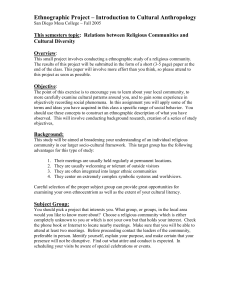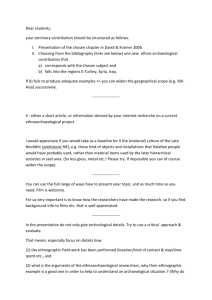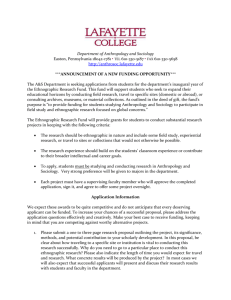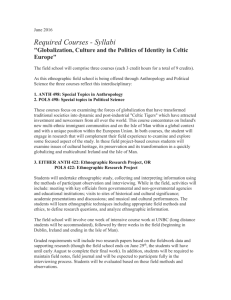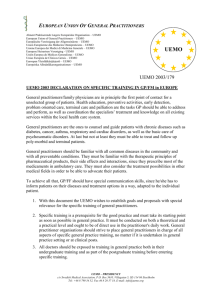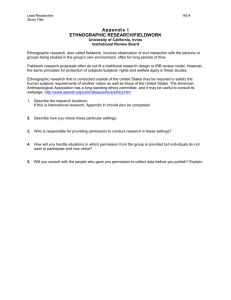Seminar 8 Abstracts
advertisement
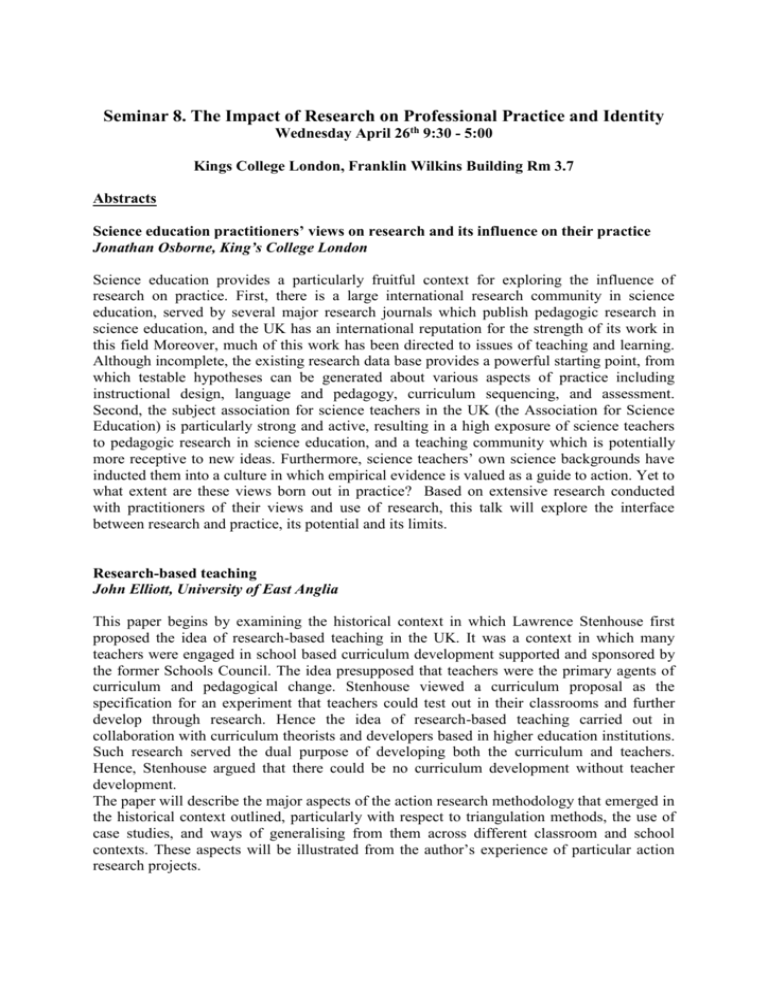
Seminar 8. The Impact of Research on Professional Practice and Identity Wednesday April 26th 9:30 - 5:00 Kings College London, Franklin Wilkins Building Rm 3.7 Abstracts Science education practitioners’ views on research and its influence on their practice Jonathan Osborne, King’s College London Science education provides a particularly fruitful context for exploring the influence of research on practice. First, there is a large international research community in science education, served by several major research journals which publish pedagogic research in science education, and the UK has an international reputation for the strength of its work in this field Moreover, much of this work has been directed to issues of teaching and learning. Although incomplete, the existing research data base provides a powerful starting point, from which testable hypotheses can be generated about various aspects of practice including instructional design, language and pedagogy, curriculum sequencing, and assessment. Second, the subject association for science teachers in the UK (the Association for Science Education) is particularly strong and active, resulting in a high exposure of science teachers to pedagogic research in science education, and a teaching community which is potentially more receptive to new ideas. Furthermore, science teachers’ own science backgrounds have inducted them into a culture in which empirical evidence is valued as a guide to action. Yet to what extent are these views born out in practice? Based on extensive research conducted with practitioners of their views and use of research, this talk will explore the interface between research and practice, its potential and its limits. Research-based teaching John Elliott, University of East Anglia This paper begins by examining the historical context in which Lawrence Stenhouse first proposed the idea of research-based teaching in the UK. It was a context in which many teachers were engaged in school based curriculum development supported and sponsored by the former Schools Council. The idea presupposed that teachers were the primary agents of curriculum and pedagogical change. Stenhouse viewed a curriculum proposal as the specification for an experiment that teachers could test out in their classrooms and further develop through research. Hence the idea of research-based teaching carried out in collaboration with curriculum theorists and developers based in higher education institutions. Such research served the dual purpose of developing both the curriculum and teachers. Hence, Stenhouse argued that there could be no curriculum development without teacher development. The paper will describe the major aspects of the action research methodology that emerged in the historical context outlined, particularly with respect to triangulation methods, the use of case studies, and ways of generalising from them across different classroom and school contexts. These aspects will be illustrated from the author’s experience of particular action research projects. Although the idea of ‘teachers as researchers’ remains a popular one, both nationally and internationally, and often supported by policy makers, the paper will argue that in the UK at least it has taken on a different trajectory of meaning that is shaped by the instrumentalist and objectivist rationality currently dominating the policy context of education. In doing so he will draw on a study he did for the ESRC in the mid-nineties on teacher research in the context of post-graduate degree’s, and his experience of issues surrounding the development of evidence-based teaching in the current policy context. The idea of research-based teaching has become dissociated the paper will contend from most of the theories of educational change that gave birth to it. A loose thread of research in a ‘seamless garment of professional development’ 1 Jim McNally, University of Stirling Regular ethnographic interviews with teachers throughout their first year of teaching reveal individual narratives of emerging self-as-teacher identities in which the emotional – relational dimension of their experience is prominent. Attempts to elicit any specific examples of more cognitive aspects of the process of learning to teach tend to return to this central theme of becoming a teacher through maturing relationships with children taught and close colleagues in a new context. Reference to the professional standard in specific or general terms in the first few months of teaching is negligible, though some connections can be inferred (e.g. with differentiated teaching) from about half way through the first year. Yet specific instruments developed within the project indicate that (1) job satisfaction amongst these new teachers, and (2) classroom performance as evaluated by the children they teach, is generally at a high level. The evidence suggests that the lived experience of beginning teaching is not in effect governed in by the professional standard and, furthermore, that it may be detrimental to early professional learning and support to presume that it is. However, the paper seeks to find a resolution to this apparent conflict through arguing for (a) a clearer appreciation within policy of the purpose of the standard and its limits in relation to professional learning, (b) evidencebased identification of those facets of the standard that do have some developmental significance for beginners. Dissemination or dissimulation? Issues in reporting ethnographic research findings to participant ‘user’ groups Geoff Troman, Roehampton University Following attacks on educational research for being, among other things, remote from users, there is now widespread support from researchers and funders for both the involvement of ‘users’ in the research process and for research findings to be disseminated to practitioners and policy-makers. There is a clear intention here to promote research which links theory and policy/practice. In this paper I outline the strengths of ethnographic research and its capacity to fulfil these aims. The paper then considers the dissemination of ethnographic research and 1 The paper is based on findings from a TLRP Phase 3 Project, funded by the Economic and Social Research Council: Enhanced competence-based learning in early professional development. The sample at this stage of reporting is some hundred first year teachers in secondary schools across Scotland. identifies some of the issues raised in this process. While these are not unique to this mode of research, they are particularly pronounced, given the relationship between the ethnographic researcher and participant ‘users’ in the research. I conclude by considering possible strategies for overcoming some of the problems which are faced in disseminating research findings implicitly or explicitly critical of practitioners to participant ‘users’ which may avoid the situation of researchers having to ‘dissimulate’ in their reporting. Using research to enhance professionalism in FE (further education) - what conditions of labour are conducive to practitioner research: the case of FE Mark Goodrham, Calderdale College An identified historical lack of a ‘research culture’ in FE (Elliott 1996) may have served to reinforce its secondary or ‘Cinderella’ status (Randle and Brady 1997) within UK education provision. This study nevertheless determined to explore research engagement where it could be located in five general FE colleges located in the north and north east of England. The purpose of the study was to understand how research and understandings of practitioner professionalism might be connected and how research engagement might even help to rejuvenate practitioner professionalism. Research ‘enthusiasts’ were identified in colleges through Learning and Skills Development Agency (LSDA) Learning and Skills Research Networks (LSRN). Through a wider sample in each ‘enthusiast’s’ college, comprising their colleagues and managers, their participation in ‘research activity’ in a broad sense was located within the context of their organisation and the wider FE sector. Participation in ‘research activity’ by FE practitioners was understood as indicating an engagement in professional understanding and development of practice (Goodrham 2005). All participants were encouraged to define ‘research’ in their own terms. The first part of this paper will outline the theoretical development of the study in relation to notions of ‘professionality’ (Hoyle 1974, 1995), FE practitioners’ conditions of labour and where research activity might theoretically be likely to reside in relation to ‘extended’ forms of FE practice. It will then explore the importance of dispositional and contextual factors in defining the conditions of labour described by data derived from the study. The second part of the paper will present further case study material to demonstrate the kind of research activity described by individuals’ accounts in relation to the dispositionally and contextually determined factors defining their practice. Colleges’ organisational priorities with respect to opportunities for research activity were in some cases especially important and examples are described. The paper suggests that the balancing of dispositional and contextual factors is critical to individuals’ understanding of their professionality, their engagement in research activity in FE and that the relationships observed between the two were fragile and easily interrupted when the balance between personal and organisational priorities shifted.

